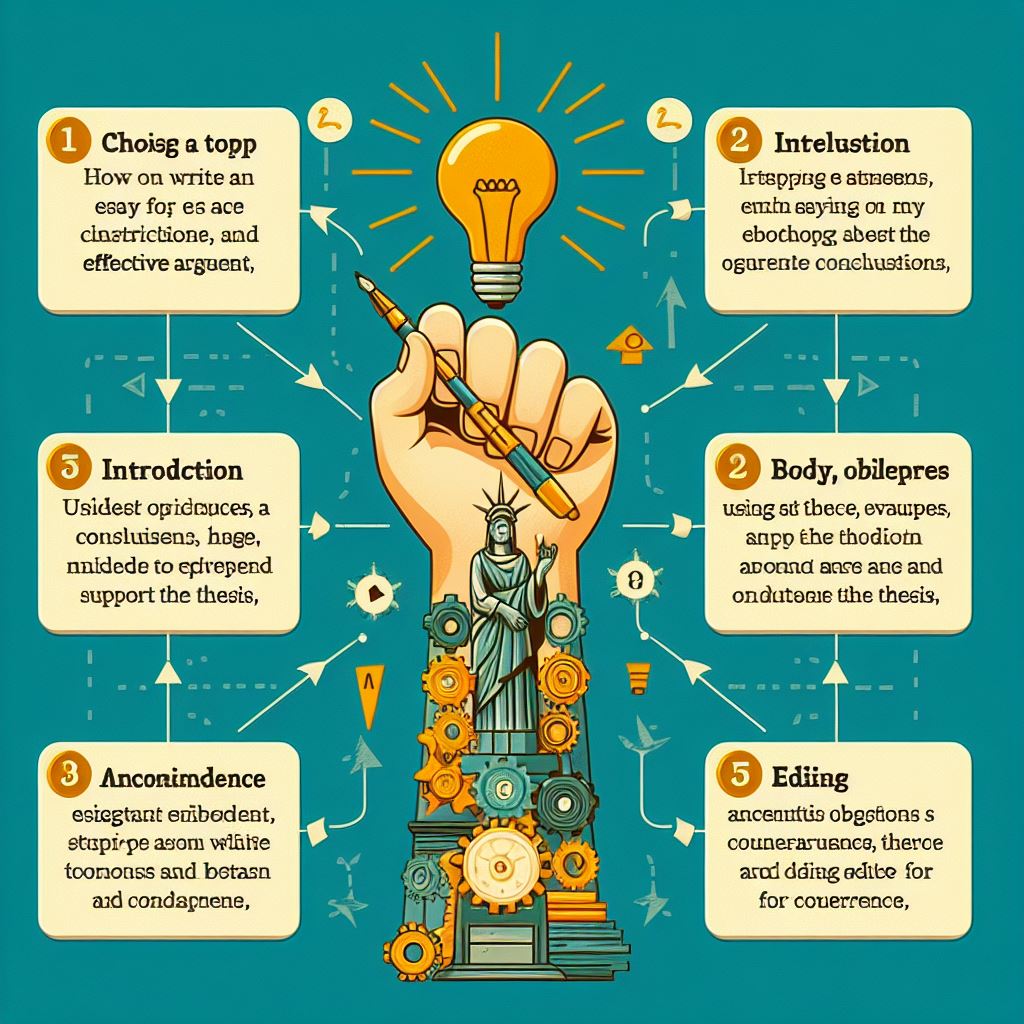How do I write an essay that makes an “argument”?
Understanding how to craft an essay centered on an “argument” involves adhering to some fundamental principles while acknowledging varying interpretations. The term “argument” can encompass diverse nuances depending on the context or a professor’s specific expectations. To navigate this effectively, seeking clarification from professors regarding their definition of an “argument” can offer valuable insights and examples that align with their requirements. Engaging with instructors during classes or office hours facilitates a clearer understanding of their specific expectations, allowing for tailored approaches to essay writing.

In the realm of essay writing, there are common, agreed-upon standards for constructing persuasive arguments. At its core, an argumentative essay presents a clear viewpoint or stance on a particular topic or issue. It substantiates this perspective by providing compelling evidence, logical reasoning, and pertinent examples. An effective argument should offer a coherent and structured narrative, integrating critical analysis and supporting information to sway the reader toward the author’s viewpoint. This persuasive discourse aims to convince the audience of the validity and credibility of the presented argument.
Crafting a persuasive essay necessitates a systematic approach. It involves formulating a clear thesis statement that encapsulates the central argument and guides the essay’s direction. Supporting this thesis requires marshaling relevant evidence, logical reasoning, and counterarguments to strengthen the persuasive stance. By embracing these foundational elements of argumentative writing, authors can construct compelling essays that effectively convey their viewpoints while engaging readers with well-supported and convincing arguments.
Why We Make Arguments
Crafting an argument within an academic context transcends the mere presentation of facts; it’s an artful orchestration of critical thinking, analysis, and persuasive reasoning. In the academic realm, arguments are vehicles for articulating viewpoints, supported by evidence, and engaging in intellectual discourse. They serve as the bedrock of critical thinking, fostering a deeper understanding of complex subjects while encouraging the exploration of diverse perspectives and interpretations. Understanding the intricacies of constructing an argument is not just about presenting opinions; it’s a journey into the realm of substantiated claims and thoughtful engagement with information.
The Purpose of Critical Thinking
In higher education, the objective extends beyond simple memorization or the repetition of data. Instead, students are encouraged to cultivate critical thinking skills, a pivotal aspect of interpreting information. This multifaceted process involves a deeper engagement with the material, prompting individuals to delve beneath the surface and extract meaning beyond the explicit content. It’s not solely about absorbing facts; it’s about actively engaging with information, questioning its significance, and formulating personal interpretations. Critical thinking requires individuals to evaluate, synthesize, and analyze data, enabling them to construct nuanced perspectives rather than merely regurgitating information.
This active approach to learning not only allows students to comprehend the material but also equips them with the tools to question, assess, and extrapolate implications from the information they encounter. Critical thinking fosters the development of independent thought, encouraging individuals to navigate beyond the surface level of information to form reasoned opinions. It’s an instrumental skill that empowers individuals to question assumptions, evaluate evidence, and articulate informed viewpoints based on rigorous analysis and interpretation.
Constructing Persuasive Arguments
Crafting an argument within academia involves more than simply stating an opinion. It requires the synthesis of critical thinking, research, and coherent communication. Students, when tasked with developing an argument, delve into the realms of analysis, evaluation, and interpretation. This intricate process demands a deep understanding of the subject matter, the capacity to dissect information, and the ability to present cogent claims backed by credible evidence. It’s not merely about expressing personal opinions but about constructing a well-supported position through careful consideration of various perspectives and robust evidence.
Moreover, arguments in academic contexts aren’t solitary assertions but are interconnected with the scholarly conversation. They’re embedded within a larger discourse, engaging with existing theories, research, and ideas. By participating in this ongoing conversation through well-crafted arguments, students contribute to the academic community, evolving their own ideas while adding depth and insight to existing knowledge.
Engaging in Constructive Discourse
In the realm of academic argumentation, the focus isn’t limited to voicing individual opinions but extends to understanding the methodologies and rationales behind divergent viewpoints. Engaging in this exchange of ideas enables individuals to appreciate the complexities of different perspectives. It encourages an open-minded approach that involves critically examining the merits of various arguments, appreciating the nuances within the discourse, and evaluating the evidence and reasoning presented.
This multifaceted dialogue is pivotal in academia, allowing individuals to broaden their horizons beyond personal convictions and delve into the diverse landscape of scholarly opinions. By acknowledging and comprehending different viewpoints, students not only fortify their own arguments but also cultivate a more nuanced understanding of the subject matter, honing their critical thinking skills and enriching their academic journey.
Making a Claim
Crafting a persuasive argument demands clarity and focus, with the cornerstone being the thesis statement, an anchor around which your entire composition revolves. Establishing a robust thesis involves defining a core stance and understanding the pulse of your audience to effectively convey your message. The process of refining and evolving your thesis over the course of writing is integral to shaping a compelling argument that resonates with your readers.
Defining the Central Argument
The process of crafting a robust thesis is a profound exercise in self-reflection and discernment. It necessitates delving into the depths of your ideas to distill them into a succinct yet impactful statement that mirrors the essence of your work. Beyond merely encapsulating your viewpoint, a well-forged thesis serves as the nucleus around which your entire discourse orbits. It acts as a guiding force, shaping the contours of your argument and lending a cohesive structure to your narrative. Achieving a compelling thesis hinges on a meticulous examination of the argument’s breadth and depth, the array of evidence you intend to present, and the profound significance of your viewpoint in relation to the subject matter at hand.
This foundational element functions as a beacon, illuminating the path your writing will tread. It necessitates a thoughtful synthesis of your central ideas, condensing them into a statement that not only communicates your stance but also encapsulates the essence of your intended discourse. Crafting a thesis isn’t merely a declaration of intent; it’s a meticulous fusion of your perspective, the anticipated evidence, and the relevance of your argument to the broader context. Ultimately, a robust thesis acts as the linchpin, anchoring your narrative and empowering your audience to engage with your argument in a meaningful and persuasive manner.
Adapting to the Audience
Crafting a thesis that resonates with your audience involves a deep understanding of their inclinations, expectations, and points of view. It’s about forging a connection that transcends words—an empathetic bridge that aligns your argument with the readers’ sensibilities. By comprehending their perspectives and interests, you gain invaluable insight into how best to articulate your central claim. This knowledge empowers you to frame your thesis in a way that not only captures their attention but also speaks directly to their concerns and interests. Adapting your argument to cater to the audience’s needs enhances the persuasiveness of your writing, fostering a sense of relevance and resonance that draws readers into the heart of your discourse.
The synergy between your thesis and your audience is pivotal in achieving persuasive communication. Aligning your argument with their expectations allows for a seamless transmission of ideas, fostering a stronger connection with your readers. An adeptly tailored thesis doesn’t just convey information; it speaks directly to the readers’ interests, compelling them to delve deeper into the narrative you present. Understanding and adapting to your audience’s needs grants your argument a persuasive edge, making it more compelling and impactful within the context of their perspectives.
Refining the Thesis
A thesis statement isn’t etched in stone; rather, it’s a dynamic entity that evolves in tandem with your exploration of ideas and evidence. As you navigate the writing process, revisiting and refining your thesis becomes a pivotal step in enhancing its potency. Embracing the iterative nature of revision allows you to embrace the organic growth of your argument, accommodating newfound insights, perspectives, and supporting evidence that arise during your research journey. Each revision acts as a cornerstone for fortifying your argument, enabling it to maintain focus, relevance, and robust substantiation by compelling evidence. The iterative refinement process contributes significantly to the depth and clarity of your thesis, signifying your unwavering dedication to presenting a well-supported, cohesive, and persuasive argument.
Revision isn’t merely about rectifying errors; it’s a nuanced practice that cultivates refinement and clarity. Each round of revision infuses your thesis with renewed strength, enriching it with refined ideas and stronger evidence. The cyclical process of revisiting and reworking your thesis fosters a more comprehensive understanding of your argument’s nuances, allowing for a deeper exploration of your chosen topic. This continual refinement demonstrates your commitment to crafting a coherent, persuasive, and evidence-backed thesis statement that effectively communicates your central claim to your audience.
Supporting Your Claim
Formulating a persuasive argument necessitates more than mere opinion-sharing; it involves constructing a robust claim supported by sound reasoning and evidence. Crafting a successful argument requires a structured approach, presenting a clear stance backed by logical reasoning and relevant support. To initiate this process effectively, understanding the core components of a compelling argument and the structural framework of your essay is crucial. This comprehension lays the groundwork for creating a persuasive and impactful argument that engages your audience effectively.
Developing a Strong Foundation
Establishing a firm foundation for your argument involves deliberating on the rationale behind your position. Ask yourself, “What factors contribute to substantiating my claim?” and “What information does my reader require to grasp and endorse my standpoint?” Constructing a compelling argument necessitates offering evidence and coherent reasoning that fortify your stance. It’s crucial to weave together reasons that validate or bolster your viewpoint and integrate corroborating evidence from credible sources, amplifying your reader’s comprehension of your stance.
Evolution of the Thesis
As you navigate through diverse lines of reasoning and explore additional source materials, remain flexible in refining your thesis. Embrace the process of adaptation, allowing your thesis to evolve in tandem with new insights and evidence that emerge during your research. Ensuring alignment between your central argument and the supporting rationale is essential. Integrate each primary support into your thesis statement to provide a clear trajectory for your argument from the outset, guiding your readers toward your perspective.
Call to Action
The conclusion of an argument serves as a pivotal moment to drive home the significance of your stance and supporting points. It’s your opportunity to leave a lasting impression on your readers, encouraging them to reflect on the implications of your argument. In crafting this concluding section, consider the broader implications of your position and the information presented. Pose questions like, “How does my argument contribute to the broader conversation?” or “What actions or thoughts should my readers take away from this piece?” This final stage in your argumentative essay should resonate, leaving a lasting impact on your audience and compelling them to contemplate the broader relevance of your ideas.
Crafting a Persuasive Conclusion
The culmination of an argument often incorporates a compelling “call to action” that prompts readers to act or believe in alignment with the presented information. Determining this aspect of your argument involves contemplating the significance of your stance and supporting points. Ask yourself, “Given the evidence and my position, why does it matter?” or “What do I aim to inspire my audience to believe or undertake after engaging with my work?” This final phase of your argument should encapsulate the importance and implications of your stance, compelling readers to consider its significance beyond the text.
Universal Expectations in Argumentation
While the nature of arguments might vary across disciplines and contexts, the fundamental expectation remains consistent: an argument should contain a central claim bolstered by substantial evidence and reasoning. These components provide the backbone of a persuasive argument, ensuring clarity and coherence throughout your writing. Emphasizing the importance of your position and its supporting elements reinforces the credibility and persuasiveness of your argument.
What can the Writing Center do to help?
At the Writing Center, we provide comprehensive assistance to fortify your argumentative writing skills. Our consultants are adept at refining and formulating central arguments, working collaboratively with you to craft compelling theses that resonate with your audience. Whether you’re at the conceptualization stage or already have a draft, we offer tailored support to enhance the clarity and effectiveness of your argument. Additionally, our consultants excel in deciphering assignment prompts, ensuring a clear understanding of your instructor’s expectations, and aiding in the development of pertinent questions for further clarity.
Crafting a Central Argument
In the supportive environment of the Writing Center, our consultants specialize in guiding students through the intricate process of articulating a well-defined and persuasive central argument. Collaboratively, we assist in refining your position or thesis statement, exploring various angles and perspectives to effectively engage and persuade your audience. Through in-depth discussions and strategic planning, we aim to help you craft a compelling argument that resonates with clarity and conviction.
Refinement and Emphasis
For those who have already developed their argument, our consultants provide expert guidance in refining and amplifying its impact. We meticulously analyze your writing, identifying areas where the argument may require further elucidation or reinforcement. By offering constructive feedback and engaging discussions, we collectively work towards emphasizing the argument’s salient points, ensuring its coherence and persuasiveness are strengthened.
Understanding Assignment Expectations
Grasping the intricacies of assignment guidelines is paramount to constructing a robust argument. We assist in dissecting assignment prompts, aiding in the comprehensive understanding of your instructor’s expectations. Through detailed discussions centered around your assignment sheet, we facilitate the clarification of requirements, empowering you to pose pertinent questions and align your work effectively with the objectives outlined in the assignment.


